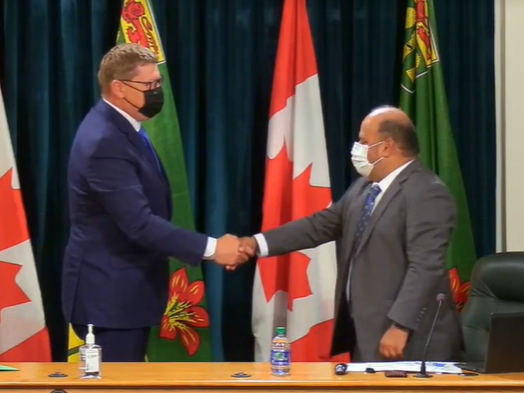485 days of public health restrictions will be coming to an end this Sunday, including here within Lloydminster.
With over 71 per cent of people in the province having received their first COVID-19 vaccine, and over half the province’s eligible residents now being fully vaccinated, all public health guidelines regarding COVID-19 will be discontinued by July 11th, this Sunday. The provincial state of emergency also ends on that day.
Among the remaining restrictions being ended are mandatory masking and limits on gathering sizes. Along with these, restrictions for long-term care home visits are gone, and school will go back to normal too. With that said, the Government has provided some insight into some of these topics in post restrictions life.
Masking is a matter of comfort now, province notes
While mandatory masking is no longer in place as of Sunday, residents and businesses will still have the choice to wear them if they want to.
The province says businesses or facilities can make their own optional mask policy. If one of these locations so chooses to have a mask policy, people will have to follow it or choose not to visit the business.
The Government also cautions people who are unvaccinated or partially vaccinated to still consider masking, even if it is not mandated.
Businesses will adapt workplace guidelines around COVID
How a business or workplace chooses to deal with COVID-19 will be a part of their Occupational Health and Safety policy. The Government has released guidelines for endemic COVID-19 transmission to be added to a plan.
With the exception of rare cases where a hazard assessment has identified that there may be a high risk of transmission in the workplace, testing or proof of a negative COVID-19 test will be considered private personal health information.
An employer is required to have policies and procedures in place to inform the employees of the requirements and how their personal health information will be collected and stored, should there be a high-risk transmission, the province says.
Businesses can find more guiding information on the Government of Saskatchewan’s website.
Long term care facilities will have no visiting restrictions, some screening and masking to continue to be required
Long term care homes can have an unlimited number of visitors and family members for their residents.
When someone arrives for a visit, they’ll still be screened for symptoms of COVID-19 and will be offered rapid antigen testing in SHA facilities. Staff will continue to mask, screen and rapid test for COVID-19 , and visitors are recommended to continue masking up too as well.
Masking and screening will still be required for all patients and visitors to Saskatchewan’s acute care health facilities and Saskatchewan Cancer Agency facilities until further notice.
Schools will go back to normal pre-pandemic operations
When the new school year hits, K to 12 schools across Saskatchewan will go back to pre-pandemic operations. Licensed child care facilities can return to regular pre-pandemic operations as of July 11.
While children can still contract or transmit COVID-19, all activities with children will be considered a lower risk if someone engaging with them is fully vaccinated.
While kids under 12 don’t have a vaccine approved for use yet, the government says all residents 12+ are encouraged to be fully vaccinated to create the best circle of protection possible.
Being COVID aware is the key to living with COVID-19, health officials explain
With the province getting back to normal, the government says, it doesn’t mean COVID is going away. Instead, by being cautious, they explain, people can prevent it’s spread.
Public health officials will continue to monitor for localized COVID-19 outbreaks, and contact tracing will continue into the future.
Cases and close contacts who are not fully immunized may be advised to isolate by public health officials, and if someone is sick, they should continue to stay home, arranging for a COVID test when needed.
The province also explains that being fully vaccinated is the best protection against COVID-19, and people should continue getting vaccinated if they still need to be fully immunized.




